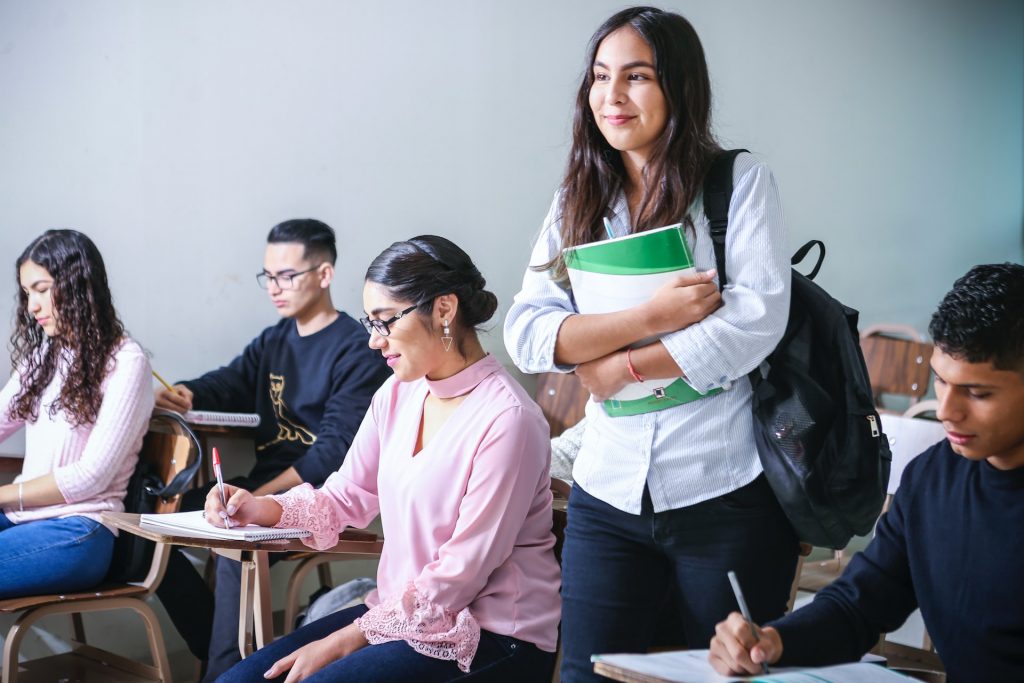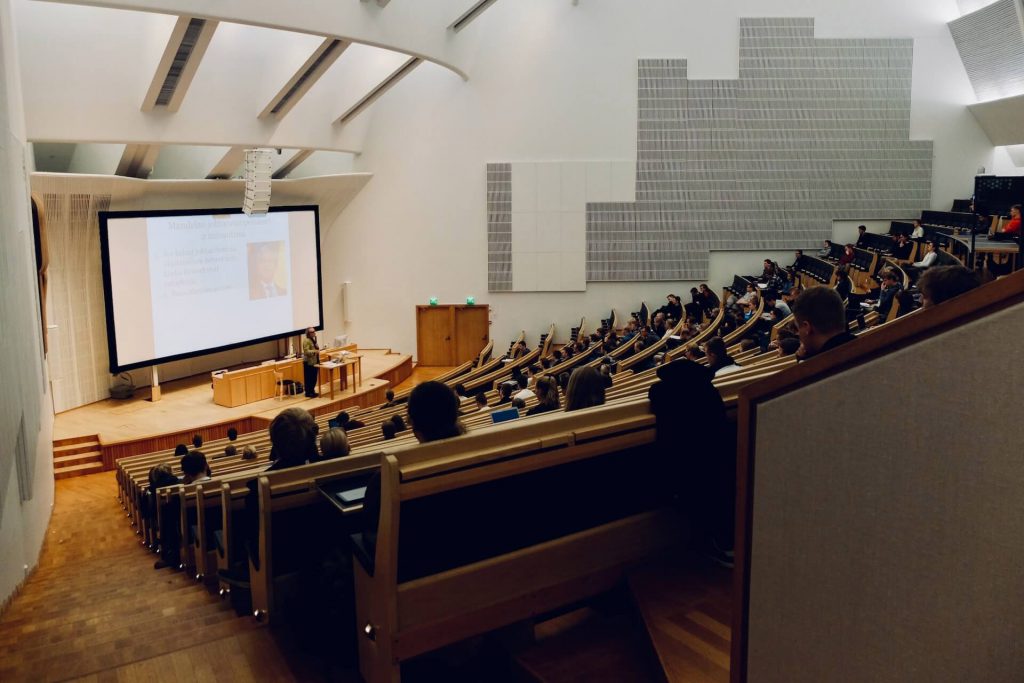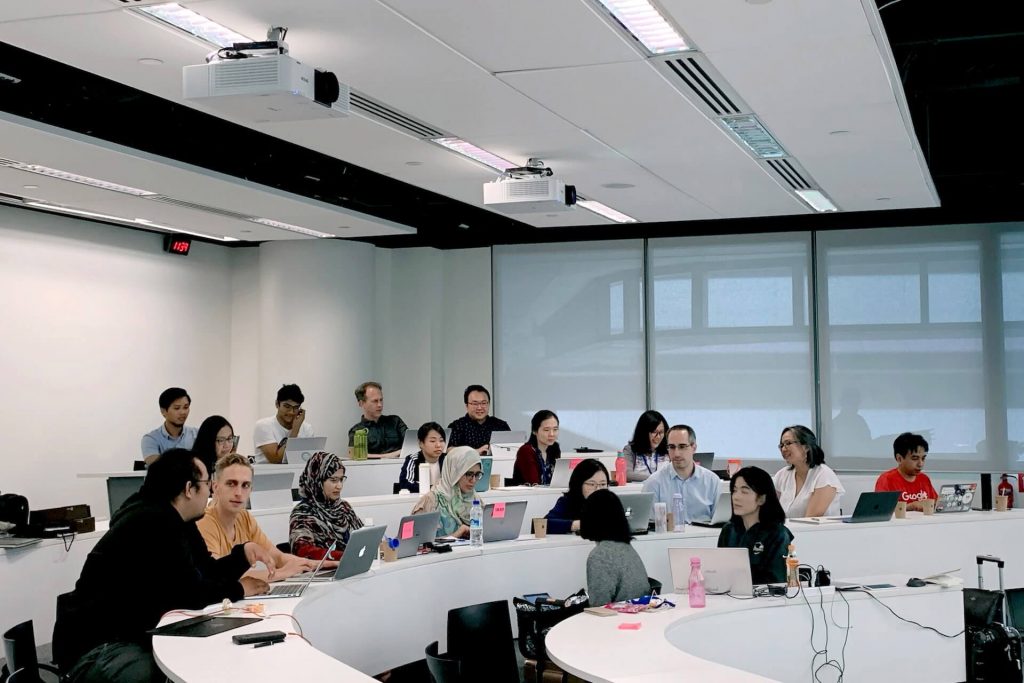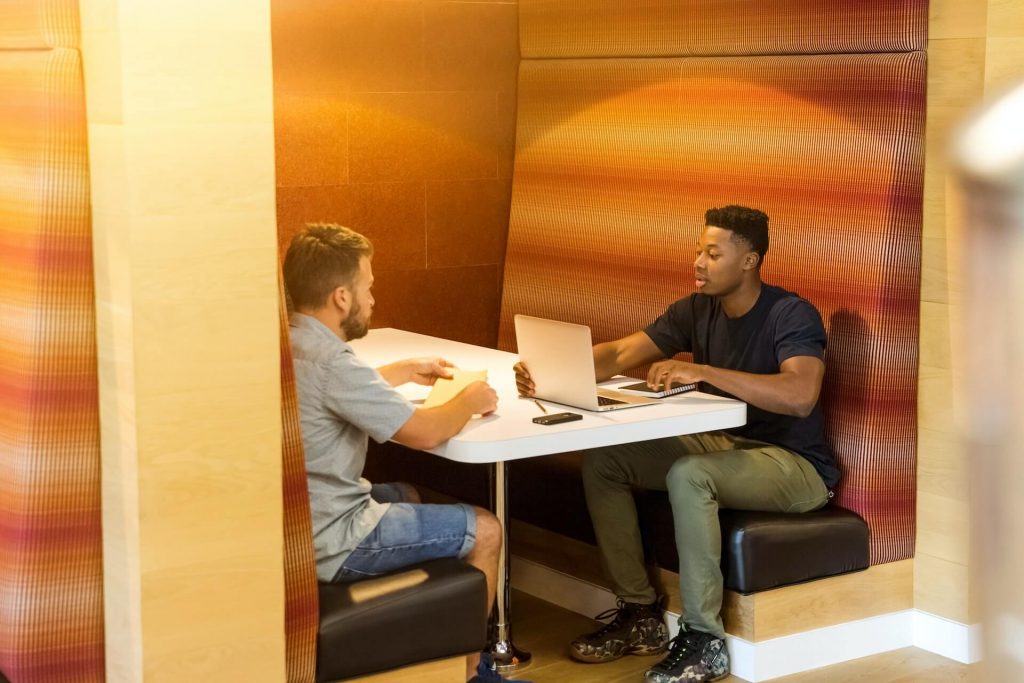What are seminars, lectures, & workshops? (The ULTIMATE university class GUIDE)

Wondering what the difference between a lecture, seminar, and tutorial is? Wonder no more—we break down the different university class types you’ll encounter and how to make the most of them.
What are the different types of classes at university?
University classes come in many flavours—from large classes in lecture halls to small group sessions—and can involve presentations, group discussions, or live problem-solving. Some classes (though only a minority) are even assessed.
Most universities deliver teaching using a blended learning approach. Blended learning is a fancy term to describe a mix of online and in-person teaching.
Online learning has enriched the learning experience by allowing more flexible, creative class formats. The main types of university classes used in blended learning are:
- Lectures
- Seminars
- Workshops
- Practicals
- Tutorials
Some universities prefer different class types and vary the language used to describe them. So the actual class types you encounter will depend on which university you’re at and which course you’re on. You may not experience every class type on your course, but their underlying principles remain the same.
As you’ll see, the different class types all support each other to give you a well-rounded learning experience. So let’s explain them individually, starting with the humble lecture.

What are university lectures?
If the word “lecture” makes you think of someone standing in front of a class presenting a slide deck to a room full of students sitting in chairs, you’re on the money. They are the most one-way of all the class formats a typically involve very little class participation. You usually listen and take notes; that’s it.
Lectures often take place in large lecture theatres and may be delivered to students on multiple courses together. They can also occur in smaller classrooms, where they are delivered just to students on your course.
Classroom lectures tend to be more intimate and organic and are more likely to involve class participation.
Lectures are often used to introduce new concepts, which are then explored in more detail using smaller classes in different formats.
They vary in length from 30 minutes to two hours, with most lectures being 45-90 minutes. The number of lectures you have each week will depend on your course and year of study. It could be as low as one a week or as high as ten a week. It’s common to have several lectures a week in your first year and fewer in your following years of study.
How do I get the most out of lectures?
As lectures are often used to introduce new topics, you should listen carefully and make sure you understand the main points being discussed. This will give you the critical foundational knowledge for understanding the rest of the module.
Lectures often include class handouts (digital or physical) but do not rely solely on these as reference material. Take notes using either a laptop or a notebook; whichever is your preferred method.
Laptops and notebooks each have different pros and cons. Laptops make your notes searchable and editable. And by using a cloud-based app like Evernote or Google Docs, your work is auto-saved so you’ll never lose it.
Handwriting in a notebook is proven to aid with information retention, so it may help you remember things better. You also have infinite flexibility with how you format your notes and can easily include diagrams, etc. The trade-off is that it can be hard to search and sort your notes later, and there’s always the danger you lose a notebook and everything it contains along with it.
When taking notes, use your own language and add your thoughts, as this will give you a deeper understanding of the information being presented.
If you don’t fully understand a particular talking point, highlight it and revisit it afterwards. Don’t dwell on these points; otherwise, you’ll stop following the class and miss what else is being discussed. But, if you get an opportunity to ask questions, use it to clarify anything you’re unsure about.
You should aim to leave your lectures with three things:
- a good grasp of the topic being discussed
- Comprehensive notes you can refer back to
- A list of action points and/or areas for follow-up study
How should I prepare for lectures?
Unless you have been given specific instructions, lectures usually require minimal preparation. They are about absorbing and understanding information you will use later (either in future classes, assignments, or assessments).
Aim to be well-rested and focused so you can engage with the class material. Think of the information presented in lectures as building blocks for your knowledge. If you don’t have those basic building blocks in place, you’ll find it hard to develop your knowledge on the subject. And that will make your assignments and assessments more difficult.
The worst thing you can do is zone out and miss information critical to understanding the topic, so a sharp mind and a way to take notes are essential.

What are university seminars?
Seminars are small group discussions between you and other students in your class, led by an academic (often a PhD student). They allow you to explore a topic in depth by sharing ideas and usually have a narrow focus.
Seminars in university are commonly used to build up your knowledge of a topic you have already covered in a lecture. They are a form of active learning, so you can’t just sit back and listen—you will be expected to contribute to the session, which may require some preparation.
Seminar classes vary in size from 5 to 20 and typically last 45-90 minutes. Sometimes they will follow up immediately after a lecture to explore the lecture topic in more detail. Other times you may be given reading material ahead of time, which you will discuss in class.
Seminars vs lectures: Lectures are a passive form of learning used to introduce a topic to a large class. Seminars use small class sizes and active learning methods to explore a topic in more detail.
How do I get the most out of seminars?
Seminars offer you a chance to:
- Gain a better understanding of the topic being discussed
- Hear other perspectives, which can help you think about the topic in different ways
Although you’re expected to participate in seminars, you don’t have to have all the answers. You can propose ideas as questions instead. The goal is to raise talking points everyone can discuss to improve their understanding.
They’re a chance to practice verbalising your thoughts in a small group of people, which is excellent for building your confidence around public speaking without the pressure of a large audience.
Seminars are not about being right or wrong. They’re about being open to different ideas and being prepared to change your mind. Focus on being an active listener and asking questions instead of trying to be the smartest person in the room.
Don’t make your goal to walk in with the answers—make it to walk out with them. This mindset will allow you to get the most out of seminars. It will also make you less nervous about speaking as you won’t be worried about being right; you’re just initiating discussions and gathering information.
How should I prepare for seminars?
You need to be able to propose talking points and have meaningful opinions about ideas raised by others. This requires you to familiarise yourself with the topic and reflect on your findings to formulate your own thoughts.
Familiarising yourself may mean attending a prior lecture or conducting your own research. In either case, you’ll find it helpful to jot down:
- Talking points you want to discuss
- Questions you want to ask to get clarity
- Key ideas related to the topic and your current thoughts on them
The different perspectives you hear in seminars can lead to lightbulb moments that make the puzzle pieces of a topic fit together and give you a new outlook. This is why seminars are so valuable. Approach them with an open mind, and don’t be dogmatic about your position.

What are tutorials?
Tutorials are 1-2-1 or small group sessions with you and your tutor. You will usually be allocated a specific amount of tutorial hours for each module or term, which may or may not be optional. Don’t ignore them if they’re optional. They’re your best chance to get tailored support and privately ask questions about things you aren’t sure about.
Tutorials are a way to get personalised feedback from your tutor. They will often focus on your progress with a particular assignment, but their scope can be broader than this. You will usually have a say in their agenda so you can tailor them to meet your needs.
As tutorials give you your tutor’s undivided attention, you can use them to clarify complex topics you feel you don’t fully understand. This can help you break through things you’ve been struggling with, which makes tutorials uniquely valuable. Don’t dismiss them because they’re optional—use every tutorial opportunity you have.
How do I get the most out of tutorials?
You have more control over how you use tutorials than any other learning session, so tailor them to your needs. Effective ways to use tutorials include:
- Asking questions to clarify complex topics you feel you don’t fully understand
- Asking for assignment feedback
- Discussing the best way to approach aspects of an assignment you’re not sure about
- Exploring potential research areas or resources that could help you with an assignment
- Getting general feedback on your strengths and which development areas you should focus on
How should I prepare for tutorials?
To get the best out of your tutorial time, reflect on which areas you wish to better understand. Make a note of any questions you want answering.
Before requesting a tutorial, you should know what you want to get out of it. Your tutor will follow your lead, so this will help you keep the focus and scope of the discussion in the right place.
If your tutorial sessions aren’t timetabled, email your tutor to request one and briefly describe what you would like to discuss. This will help them prepare so they can give you the support you need.
Have the confidence to be vulnerable, and don’t avoid asking things you think you should already know. These 1-2-1 sessions are your chance to get the critical support you need, so use them to your advantage.
What are workshops?
Workshops are active problem-solving sessions. They often involve group work and presentations. The typical class size is around 20-30 students, though you’ll usually be split into groups of 5-6, each working on different tasks.
Workshops are an opportunity to apply the theoretical knowledge from lectures and seminars to a specific problem. You’ll either be briefed on the problem in advance of the class or at the start of the session. They commonly take the form of case studies (either real-world or hypothetical).
Your group task is usually to break down the problem and suggest solutions or outcomes in response to the brief. You will typically present your findings to the class so everyone can learn from each group’s work. This gives you a chance to practice your presentation skills.
Workshops can sometimes count towards your grade. Be aware of whether a workshop is assessed before you attend, as this will affect how you prepare and engage with it.
Many universities also run (somewhat confusingly named) “academic workshops”. These are intended to teach you specific academic skills, such as essay writing or using a piece of software, and should not be confused with curriculum-based workshops.
How do I get the most out of workshops?
Workshops are opportunities to test your knowledge and try out ideas in a simulated real-world setting.
Group dynamics play a big role in workshop settings, and you must navigate these alongside the task. Some people will naturally try to dominate, while others will be passive. Personality clashes are common. Avoid personal confrontations, judge people’s contributions on merit, and provide constructive feedback.
Share your ideas with your group so you can get feedback, but don’t be dogmatic about them. Don’t worry about being right, and don’t hold back ideas you’re not confident in. It can be tempting to sit back and let other group members do the work, but you’ll get much more out of workshops by actively participating and making suggestions.
Explain your thinking if your ideas are challenged but don’t get defensive. How people respond to your suggestions gives you helpful feedback. If they’re positive, you could be onto something and can explore it as a group. If they’re negative, listen to their reasoning and be prepared to let go of ideas that don’t hold up to scrutiny.
Listening skills are just as vital as making suggestions. Give people space, respect their ideas, and they should do the same in return.
If you can’t reach a consensus as a group, verbalise your position, but don’t take it personally if the group decides to go with an alternative. Everyone in your group is on the same team working towards the same goal.
It doesn’t matter if you or anyone else in the group is individually right or wrong. What matters is whether you can collectively get the best outcome. And the best way to achieve that is by playing the role of a “critical friend” by giving and welcoming supportive, non-judgemental critical feedback.
At their best, workshops are fun, dynamic sessions that bring to life the theoretical ideas you learn in other class formats. As such, they support lectures and seminars very well.
If a workshop is not assessed, treat it as a learning opportunity and a chance to explore thought experiments with your group to deepen your understanding of the topic.
If a workshop is assessed, prepare well and engage deeply. Push for whichever solution holds the most merit—whether it is proposed by you or another group member—and ensure your group’s solution meets the assessment criteria.
How should I prepare for workshops?
If you have been sent a brief in advance, brainstorm ideas around the problem you will be working on. Look for potential solutions and have an idea of their pros and cons so you can discuss them with your group.
If you aren’t given a brief in advance, it’s hard to do much specific preparation. Instead, focus on your mindset. Approach the class with an open mind, leave your ego at the door, come ready to engage, and be prepared to be challenged.

What are practicals?
Practicals are generally only encountered by students on science courses. They are lab experiments carried out under the supervision of your tutor. Lab practicals are designed to teach you a specific skill or demonstrate a concept previously presented in a lecture. They are effectively the science course equivalent of a workshop.
Practicals may involve individual or group tasks. They can either be a standalone class or contribute to an assignment. (If it’s the latter, you’ll then analyse the findings and write your conclusions in a lab report, which you submit for assessment.)
Practicals intended to teach you skills are rarely assessed, whereas practicals that are part of a larger assignment (such as a lab report) may count towards your grade. Ensure you know which one you are partaking in before you attend.
How do I get the most out of practicals?
That depends on the session objective. If it’s to learn lab skills, focus on developing good practice. If it’s about contributing to a more extensive assignment, focus on getting good data. Either way, you want to take a methodical approach that will give you reliable data. You must also understand the underlying principles of the experiment well enough to draw conclusions from it.
How should I prepare for practicals?
If you’re given the brief in advance of the class, do some preliminary research so you have a decent grasp of the experiment ahead of time. If you’re not, aim to clarify the experimental principles and purpose early in the class before carrying out any practical tasks.
Think carefully about the outcome the experiment is intended to achieve and approach it in a way that supports it. Don’t dive in impatiently only to realise too late that you’ve undermined your chance of getting good data. A patient, methodical mindset is a must.
Putting it all together – how uni classes support each other
As you may have figured out, the different types of university classes link up to create a well-rounded learning experience. In case you’re still unsure of their relationships, here’s how they combine to aid your learning:
+ Lectures introduce topics at their basic conceptual level. They can be abstract and theoretical
+ Seminars allow you to explore lecture topics in more detail through a back-and-forth discussion to clarify your understanding
+ Workshops and practicals allow you to apply what you have learnt to a real-world (or hypothetical) situation. They don’t introduce new concepts. Rather, they are about using the theories you’re familiar with from lectures and seminars to solve problems
+ Tutorials are an opportunity to get tailored support in any areas where you need to further develop your understanding

How much independent study will I do at uni?
These classes are all supported by independent learning you do outside of your timetabled hours. This is essentially the university equivalent of homework—though it will look and feel different to the homework you were given at school.
On most courses, you learn about your subject in your classes, but much of the work you’re graded on is done in your own time.
Independent uni study is usually a mix of research and working on your assignments. Its exact nature will depend on the subject you’re studying, but it will typically involve reading, writing assignments, and possibly keeping a reflective journal. (Art-based courses will have more variety in their assignment formats.)
How should I approach my independent study?
Independent study usually has one of three purposes:
- Preparing for a class or exam
- Research to support an assignment
- Working on your assignment
Always be mindful of the intention behind any independent study and what you must focus on to realise it. You may find it helpful to start at the end (i.e. with the outcome you want to achieve from a piece of independent study) and brainstorm ways to get there.
Once you can see a path to your objective, make a step-by-step to-do list and work through it until you reach the end. This will give you the focus and structure you need to work efficiently and effectively.
Independent study is just that: independent. You get minimal handholding from tutors. That’s why breaking down what you’re trying to achieve into a tangible step-by-step process is critical. Make an action plan and block out time for each step in your calendar. This will help keep you on track.
It’s important to avoid distractions so you can focus during independent study. The biggest distraction by far is your phone. Put it on do not disturb and stick it in a drawer when you sit down to work.
A good rhythm is to do focused work for 90 minutes and then take a 30-minute break (in which you can check your phone) before starting another session. Follow this pattern (with an extended break for meals), and you can sustain a good level of productivity all day.
The flipped classroom
A recent development in education is the “flipped classroom”. This turns the traditional learning model on its head. Instead of learning theory in the classroom (like a typical lecture) and then working on what you’ve learned in your own time, the flipped classroom takes the opposite approach.
Lecture materials are made available online (either as a slide deck or a recorded lecture) for you to engage with on your own before a timetabled class. Class time is then used for group discussions on the topic. This interactive learning method creates a much more participatory class environment.
There are many benefits to this approach. It creates a richer learning experience in the classroom because you can interact with other students and share ideas. It also naturally encourages a more active approach that puts you at the centre of your learning (and creates an expectation that you will prepare for classes and contribute to them).
The downside is that understanding your course material or motivating yourself to fully engage with it can be harder when you must do it alone in your own time.
Some students treat the class prep for flipped classroom learning as optional. But, by skipping it, they lack the knowledge to participate in the class and end up having a worse learning experience.
If you find yourself struggling with the flipped classroom model, the best solution is to find a study buddy and meet up with them for study sessions so you can hold each other accountable.
How do I get the most out of online lectures?
While we’re talking about the impact of technology on learning, it’s worth mentioning how to approach online classes (which you may or may not have, depending on how your course is structured).
It can be tempting to attend them from your bed, half asleep, with your laptop or iPad camera turned off. Or, even worse, just have them on in the background while doing other things (like scrolling on your phone).
Don’t do it, though—it’s a huge mistake. There’s no way you can follow along and retain what is being said in enough detail to be usable later. Even if you think you’re taking it in at the time, you won’t be. The human brain just doesn’t process information you passively engage with deeply enough to be useful.
Instead, sit down at your workspace, turn your camera on, and take notes. Treat it just as if you were in the classroom, actively engage, and you’ll get much more out of it.
How to make the most of your uni classes
If there’s one thing you should take away from this article, it’s to engage with all your classes—including the optional ones—and do the work.
Skipping class prep or anything that isn’t compulsory may seem like the easy option. But, in reality, it makes things harder because you end up with a more superficial understanding of your subject than those who engage and prepare more thoroughly.
Here’s a quote from legendary boxer Manny Pacquiao that sums up the mindset you should have:
“If you work hard in training, the fight is easy.”
That’s a winner’s mindset. It will set you up for success.
If you make an effort to engage with your course material, prepare properly for classes, do the optional extras, and use all the resources and support available, your assignments and assessments will be easy.
But if you turn up unprepared, expecting to cruise your way to a degree, you’ll find it harder to come out ahead on the scorecards at the end.
So show up, and do the work. You owe it to your future self to be able to look back once you graduate and say, “I gave it my best shot.”